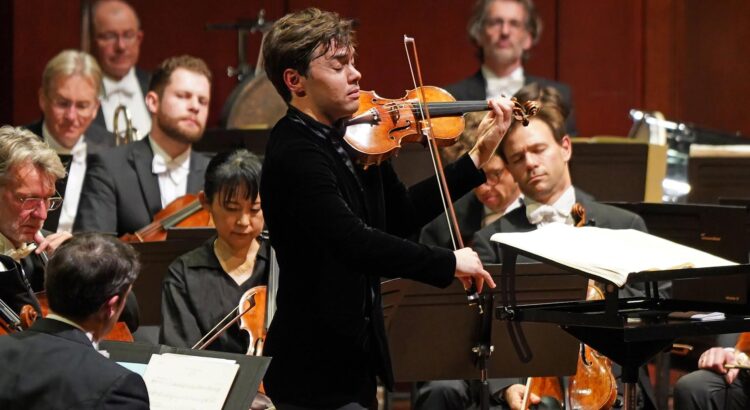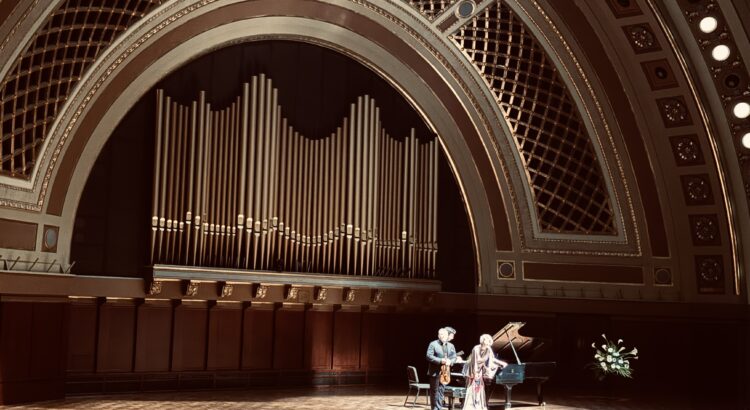Photos are provided by Peter Smith Photography
On November 23, Hill Auditorium was brimming with excited classical music lovers, and even President Santa Ono was in the audience. It was finally the night of the much-anticipated concert that had sold out months in advance. Under the baton of Kirill Petrenko, the Berlin Philharmoniker, alongside soloist Benjamin Beilman, delivered a masterful performance of Rachmaninoff’s The Isle of the Dead, Korngold’s Violin Concerto in D Major, and Dvořák’s Seventh Symphony.
Rachmaninoff’s The Isle of the Dead is a symphonic poem inspired by Arnold Böcklin’s painting Die Toteninsel. Böcklin intended his painting to evoke dreams, a quality that Rachmaninoff’s composition certainly achieved. The orchestra’s interpretation captured the audience’s attention with its heavy emotion and power. The dynamics ringing throughout the auditorium felt like crashing waves, while the layered harmonies added a sense of delicate chaos. However, when I looked up the painting, I found that the energetic, determined melodies of The Isle of the Dead largely clashed with the somber mood and muted colors of Böcklin’s work. Later, I discovered that Rachmaninoff had been inspired by a black-and-white reproduction of the painting, which allowed him greater creative freedom.
Next was Korngold’s Violin Concerto in D Major, my favorite—and I dare to assume, many people’s favorite—part of the night. Fascinatingly, Benjamin Beilman grew up in Ann Arbor and attended Community High School. He won first place at the Montreal International Music Competition in 2010, received the Avery Fisher Career Grant in 2012, has played with many major orchestras worldwide, and is one of the youngest artists ever appointed to the faculty of the Curtis Institute of Music.
When I attend concerts, I often find myself amazed by a soloist’s technique, but this time I was in awe of how much fun Beilman made playing the violin look. Rather than feeling like a performance on stage, it felt like watching a film with headphones on—which makes sense, considering Korngold was an extremely successful opera composer who also played a major role in shaping early movie scores. At times, the softer passages in the music painted serene fields of flowers; at others, Beilman’s tone felt tangible, as if I were sipping rich, melted chocolate.
The second movement, “Romanze,” was particularly moving. The opening, with its gentle and tender chords from the winds in the background complemented by the dreamy violin melody, perfectly captured the sound of falling in love—exciting and mesmerizing. Meanwhile, the closing melody, built from odd intervals, reflected the more complex side of love—confusing yet irresistibly tantalizing.
The final piece, Dvořák’s Symphony No. 7, brought me back to Earth with its tumultuous and unexpected notes. The themes in this symphony didn’t paint vivid landscapes like those in The Isle of the Dead, but each phrase unfolded as if it were a page in a storybook. It was a piece that required a commanding and charismatic conductor to maintain its passionate energy—keeping it controlled yet never subdued—and to harness its power to blend the unexpected turns in the music into lyrical phrases. The third movement, “Scherzo,” was vivacious, its rhythm inspired by the Czech folk dance furiant.
By the end of the night, the Berliner Philharmoniker had established itself as my favorite orchestra. After delivering an enchanting, surreal, and healing performance that would convert even the worst classical music skeptic, the audience went wild—I can’t remember the last time I heard more wholehearted applause. Not to be overdramatic, but Benjamin Beilman’s performance of the Korngold Violin Concerto reminded me of how important classical music is to humanity. Combined with the Berliner Philharmoniker’s mastery, It was a night I will never forget, and I felt extremely lucky to have that experience.




